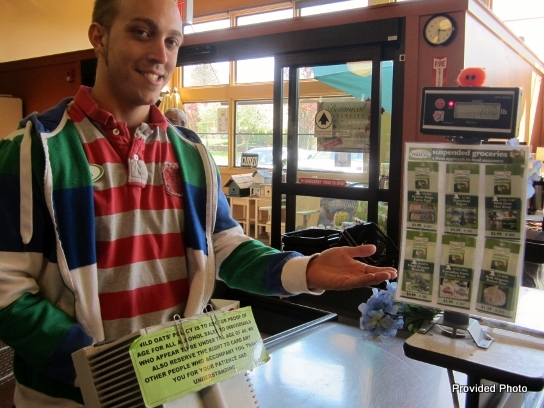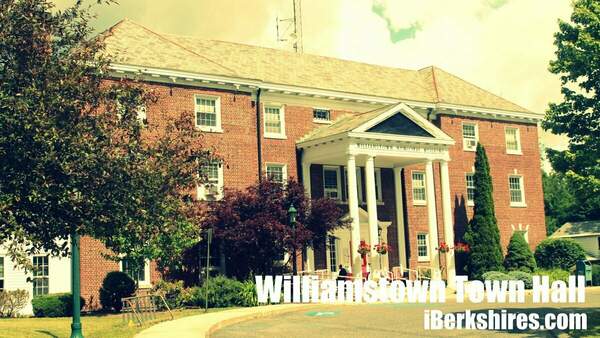Williams Students, Wild Oats Offer New Grocery Program For Food Bank
|

Wild Oats cashier Chris Mowe shows the Suspended Groceries card at the register at the Williamstown market.
|
WILLIAMSTOWN, Mass. — A partnership between the Williams College student group, Wild Oats Market and the Berkshire Food Project has produced an innovative and dignified way for people who are struggling to make ends meet to obtain food products free of cost.
Working as a team in Kinetic, a Williams College student-run think tank, Jessica Bernheim, Catharine Parker Meg Richardson and Lucas Elek designed and developed a program called "Suspended Groceries."
“It’s a spin off on a 'Suspended Coffee' program that started in Naples (Italy) and has gone world-wide. Customers of coffee shops pre-pay for coffee for a person who cannot afford it,” Bernheim said.
The students were open to partnering with any grocery store to implement Suspended Groceries but chose Wild Oats, a cooperative market that offers organic, fresh and prepared foods, and many other products for healthy living.
“Wild Oats had appeal because it has a community approach on health food,” Bernheim said.
The Kinetic team went to David Durfee, general manager of Wild Oats, with their idea for Suspended Groceries. Durfee said he was interested in the concept right away.
“It was intriguing to me because as a co-op, part of our mission is to provide health food to the community," Durfee said. “And providing a broader access to health food fit right in.”
And so Wild Oats recently launched the first Suspended Groceries program in the area - and possibly even in the country.
Durfee said it's easy for shoppers to participate. At the register, customers can choose from coupons on display and then present one or more to the cashier, who adds the price of the item represented on the coupon to the customer’s purchases. Wild Oats records the Suspended Groceries purchases and issues another coupon that is delivered to Berkshire Food Project in North Adams to distribute to their clients. The clients them come to the store to redeem coupons and pick out a particular bunch of organic broccoli, yogurt, house soup or other item for which a customer has pre-paid.
“When they get to the register they just have to present the coupon,” Durfee said.
In the future, Wild Oats may give coupons to other food banks in the area as well as Berkshire Food Project.
“We started out with a half dozen items, which ranged in price from (approximately) $ 1 to $5,” Durfee said. “For the most part, the food is not typical of what food banks stock. We intend to rotate product and, if successful, will expand to include more items.”
Since Wild Oats introduced Suspended Groceries, shoppers have prepaid for 50 food products.
"Anyone who shops at Wild Oats, whether or not they are members of the coop, can participate in the program," Durfee said. “I feel that a lot of credit should go to the students for coming up with a new way to help address food insecurity in our community. Both the Williams students and Wild Oats Market hope to see Suspended Groceries expand and become an integral part of our culture."
According to Robin Roberts, marketing and member services manager, this is the first time Wild Oats has partnered with a college group.
“It’s energizing,” she said.”The students are very excited."
Besides the obvious benefits of the Suspended Groceries ,Bernheim pointed out that "Suspended Groceries strengthens the core of the community: People coming together to shop."
The students would like Suspended Groceries to become a national trend, Bernheim said.
“We’ve been in conversation with independent stores and a couple of chains. Stores would need to have a connection with an organization that serves in a community support role for those experiencing financial difficulties," she said. "Wherever the program is put in practice, the initiative is very community-oriented."
Tags: Berkshire Food Project, Suspended Groceries, Wild Oats,
.jpg)
















